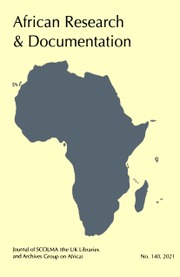No CrossRef data available.
Article contents
Subaltern Voices/Interests in Contemporary Protest Theatre in Zimbabwe
Published online by Cambridge University Press: 25 April 2022
Extract
Critics contend that Zimbabwe plunged into a political and economic crisis between 1999 and 2009. This decade in crisis witnessed a boom in a form of theatre that questions the authority and legitimacy of the state (Zenenga 2010). This theatre is highly adversarial and oppositional to state hegemony (Chivandikwa 2012). This brand of theatre, known as protest theatre, refers to a theatre that directs its efforts towards the subversion of an existing dominant ideology. In Zimbabwe, as elsewhere, protest theatre develops as an alternative platform through which citizens challenge and engage the state on issues of democratic reforms. Protest theatre, thus, aims to provide alternative democratic space (public sphere) where voices that the state-controlled media silenced can deliberate on issues of social and political transformation. Hence, from its inception, protest theatre predicates its practice upon democratic ‘ intentions.
- Type
- Research Article
- Information
- Copyright
- Copyright © International African Institute 2017




